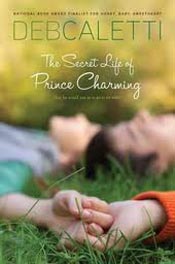A Note from Kim: After the Book Blogger Convention, I came home with a pretty sweet bag of books. Not all of them were really my thing, so I passed on a few to my sister to read and review. Jenny’s been on the blog before – last summer we did a series of Sister’s Reviews – but this is her first solo review. Please give her a warm welcome back!
I will start my review by saying that Deb Caletti has been compared a lot to Sarah Dessen. If you recall from our Sister Reviews last summer, Sarah Dessen has written one of my favorite books ever The Truth About Forever, so I had high hopes for The Secret Life of Prince Charming going in.
While I thought the book was good, due to the high hopes I had I was not as impressed as I might have been.
The Secret Life of Prince Charming is the story of Quinn Hunt and her journey to find out who her father really is. The women in her life have always warned her about bad men and cautioned her about what the warning signs are. But when her father is brought back into her life and she discovers his collection of trophies from the women in his life, Quinn decides to right his wrongs and find out the truth about who he really is.
I can break my critique and praise for this book into three categories: relatability of characters, format, and story.
Relatability of Characters
One of my favorite things about books of this genre (like Sarah Dessen) is how I can find parts of the main character to relate to myself, adding a personal stake in their problems and the way that they deal with these challenges.
I was not as able to relate to the main character of The Secret Life of Prince Charming, Quinn Hunt. The main characteristic that many young girls would find relatable about Quinn was the divorced family dynamic. Quinn’s relationship with her absent suddenly returned father is what really fuels the plot of the book.
I personally have no experience with this, so my inability to connect with this key feature in the story took out some of my enjoyment. Similarly, other parts of her personality and character traits are not fully developed.
Format
The format of the story is pretty standard for this genre: a girl with difficult situation trying to deal with something in her life meets a boy who she falls in love with (or at least “in like” with) while he helps her through whatever she is going through. Eventually the problem is “solved.”
However, this book throws a small twist in this story which I saw good things and bad things about – the typical format of the story is interrupted in seemingly randomly places by short stories about love from the different characters in the book that talk about what to be careful of when searching for love.
I found these stories interesting, and think that they are well thought-out for the target market of the book. But I also found it a little distracting – each story is introduced with the name of the character telling the story, but some women who tell the stories have not even been introduced in the story when one of their pieces of advice show up. I found this frustrating because I wanted to know how these women were connected to Quinn and her father.
Story
I liked the story of the book. It was very empowering for women in terms of how Quinn takes control of a situation related to her father and goes on her quest to right his wrongs. In comparison to the pathetic qualities of some main characters in teen fiction these days, it was nice to see a character and a story that was about not letting men and bad relationships control your life.
Conclusion
Overall, I would say that this book is a good book for young girls to read, especially those who could find a way to relate to Quinn and her broken family. I really liked the way that Quinn took her life into her own hands and decided to write her own story. I think that she would be a good character for young girls to read. The flaws I found in the story would not be shared by the books target audience, especially those who can see themselves in one of the characters.
Thanks for welcoming Jenny to the blog! Have you read this book? What do you think of Jenny’s critiques?


Comments on this entry are closed.
Deb Caletti is one of my favorite YA authors. I think of her as more adult than Sarah Dessen, though, and her books stick with me whereas Dessen’s don’t over time. I haven’t read this one by Caletti yet, but I’m looking forward to it.
I’ve never tried Caletti’s work, but this does sound interesting. I do think it’s important for that age group to be able to relate to characters in their books.